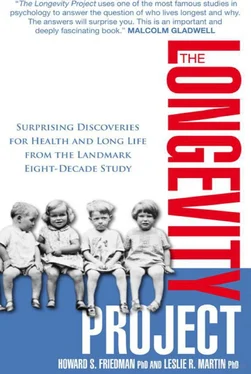Dr. Terman, ever the empiricist, looked for the qualities that distinguished subjects who had become scientists from those who had become businessmen, lawyers, and managers. The differences were so vast that he concluded that scientists and engineers are at the opposite pole from businessmen and lawyers in their abilities, occupational interests, and social behaviors.
In particular, the scientists were much more unsociable. When they were in school, these future scientists were shyer and less involved in social activities, and when they were young adults, they were less interested in social networks. These differences were just what we needed—an important clue as to why sociability did not predict who lived a long life.
We re-created Dr. Terman’s groups of scientists and nonscientists and analyzed how long they lived. The scientists outlived the nonscientists. Only two-thirds of nonscientists but almost three-quarters of scientists lived to reach age seventy. 12 12 Details of our study on the longevity of scientists vs. nonscientists can be found in H. S. Friedman, J. S. Tucker, L. R. Martin, C. Tomlinson-Keasey, J. E. Schwartz, D. L. Wingard, and M. H. Criqui, “Do Non-scientists Really Live Longer?” The Lancet 343 (1994): 296.
John was a shy child who tried to avoid playing in large groups; he preferred chess and checkers to tag or charades. He later became a physicist. It was a common pattern: the Terman participants who would go on to be scientists were much less sociable than those who became lawyers, businessmen, and salesmen. The two groups were about equal on the trait of conscientiousness. Dr. Terman asserted that there was no doubt that nonscientists scored higher than scientists in social relations. (In his report, Dr. Terman bragged that he was using the newly developed IBM electrical computers—among the first computers ever used in social science research, and a great aid to statistical computations.)
So why didn’t sociability necessarily set one on a path to long life? After all, the sociable children grew up to be adults who had better social relations, and good social relations are normally a sign of good health.
It turns out the scientists had an ace in the hole: they tended to move into stable jobs, have long-lasting marriages, and generally work in a responsible manner. The nonscientists—that is, the businessmen, lawyers, salesmen, and so on—tended to have more tumultuous, less stable, and more health-damaging careers and behaviors. Overall, sociability was a wash. It didn’t help or harm one’s expected life span. The finding is an excellent reminder that supposed health benefits are often not what they first appear to be. To truly understand them, we have to examine real lives in real contexts, over time.
Sociability and Specific Behaviors
Which aspects of early individual personality characteristics were able to predict unhealthy behaviors in adulthood? Our full team, led by Joan Tucker, a graduate student at the time, identified health-relevant behaviors at midlife, when the Terman participants were about forty to fifty years old. The sociable children grew up to drink more and smoke more over the decades. Unlike the conscientious children, who grew up to behave in healthier ways, people who were more outgoing and sociable were more likely to go along with social pressures toward drinking and smoking. 13 13 We described our findings on personality and health behaviors in J. S. Tucker, H. S. Friedman, C. Tomlinson-Keasey, J. E. Schwartz, D. L. Wingard, M. H. Criqui, and L. R. Martin, “Childhood Psychosocial Predictors of Adulthood Smoking, Alcohol Consumption, and Physical Activity,” Journal of Applied Social Psychology 25 (1995): 1884-99.
They also more frequently found themselves in an atmosphere where such activities were the “thing to do.” Interestingly, there is also substantial scientific evidence (from various investigators) that outgoing, extroverted people find the rewards of an alcohol- or tobacco-induced buzz inherently more appealing. 14 14 For more on personality and reward seeking, see Philip J. Corr, ed., The Reinforcement Sensitivity Theory of Personality (New York: Cambridge University Press, 2008) . Also see C. Davis, K. Patte, R. Levitan, C. Reid, S. Tweed, and C. Curtis, “From Motivation to Behaviour: A Model of Reward Sensitivity, Overeating, and Food Preferences in the Risk Profile for Obesity,” Appetite 48 (2007): 12-19.
It was especially intriguing to see that the effects of sociability on health-relevant behaviors held not only in adolescence but also for decades into adulthood.
SELF-ASSESSMENT: SOCIABILITY
For each of the items listed below, choose the response that best represents your feeling.
Fondness for large groups
1. I love large groups; I am unhappy when alone.
2. I consider myself to be a “social person.”
3. I consider myself to be something of a “loner.”
4. I always prefer to be alone or with just one or two close friends; I avoid crowds.
Popularity
1. I have few friends; I am socially shunned.
2. I’m less popular than average.
3. I’m pretty popular.
4. I am well liked; people seek me out and I have many friends.
Spending leisure time
1. If I had three hours to spend I’d like to attend a party.
2. If I had three hours to spend I’d want to hang out with a few friends.
3. If I had three hours to spend I might like to do something with a friend, or maybe not.
4. If I had three hours to spend I’d relish my solitude and want to spend it doing something by myself.
Life of the party
1. If a gathering is dull you can bet I won’t be doing anything to liven it up.
2. If a gathering needs livening up, I occasionally try to get it going.
3. If a gathering is dull I am likely to try to liven it up.
4. A gathering is never boring when I’m around—I can always keep things exciting.
How to score: For the first and third items, reverse your score (if you said that you love large groups and are unhappy when alone, give yourself a 4, not a 1; or switch a 2 for a 3). Once you’ve done the reversal, add up your total for all four items; the score should fall between 4 and 16. Paul and his sociable counterparts scored in the double digits, while the more reserved Terman participants like John scored closer to the low of 4. Sociability is one of the personality characteristics that is relatively easy to judge accurately, so you are likely not surprised by your score. We also tend to be good at rating people we meet on this dimension. Because it involves behaviors and characteristics we can readily observe, we quickly get a good sense of who are the popular principals in a group.
As noted, level of sociability is not related to health and longevity in a simple way. As with the scientists, lawyers, and businessmen in Terman’s studies, to understand sociability’s likely impact, you also need to take into account whether or not your sociability leads you into unhealthy friendships and activities.
Another Kind of Sociability
To delve deeper, we have been studying a special aspect of sociability—the type of sociability that allows a person to connect emotionally with others in a powerful way.
SELF-ASSESSMENT: EMOTIONAL SOCIABILITY
The novel approach we have developed for these issues of emotional sociability is illustrated by the following scale.
Not at all true of me 1 2 3 4 5 6 7 8 9 Very true of me
1. When I hear excellent dance music, my body immediately starts moving.
1 2 3 4 5 6 7 8 9
2. When I laugh, people know it—it’s a hearty laugh.
Читать дальше











